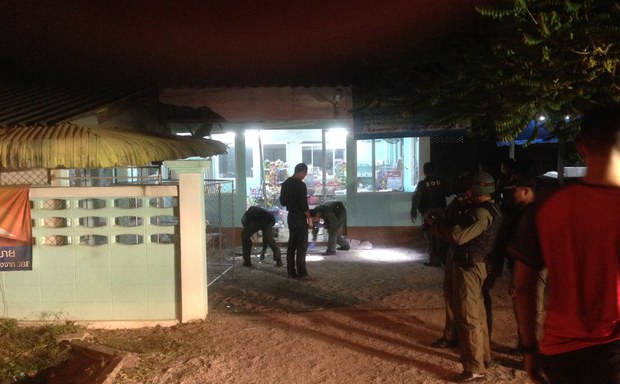2 Suspects Die in Attacks in Thailand's Deep South
2017.04.19
Pattani and Narathiwat, Thailand
 Authorities inspect the site of a bomb blast at a checkpoint in Yee Ngor district, in southern Thailand’s Narathiwat province, April 19, 2017.
Authorities inspect the site of a bomb blast at a checkpoint in Yee Ngor district, in southern Thailand’s Narathiwat province, April 19, 2017.
Suspected insurgents mounted 13 simultaneous attacks in three of Thailand’s southernmost provinces late Wednesday, and two of them were accidentally killed in a bomb explosion, officials said.
At least 10 attacks involved bombs or grenades, while the others were shootings, according to official information.
There were 13 attacks in all – seven in Narathiwat, three in Pattani and three in Songkhla – officials in those provinces of the Thai Deep South told BenarNews.
The two suspects were killed in a blast in Saba Yoi, a district in Songkhla province. Elsewhere, a security volunteer was shot and injured as he guarded a railway station in Sungai Padi, a district of Narathiwat, officials said.
“As far as we learnt from a Saba Yoi district official, the two dead tried to plant a bomb and it went off, killing them,” an official with the Internal Security Operations Command (ISOC), told BenarNews on condition of anonymity.
The string of bombings and shootings were the first attacks in Thailand’s predominantly Muslim and Malay-speaking Deep South since 23 coordinated bomb blasts and arson attacks by suspected insurgents rocked the region on April 7, taking out utility poles and causing power and internet blackouts.
Since the start of the year, 30 people have been killed and 38 others injured in violence blamed on insurgents in the Deep South.
During that time, Thailand’s military government has been negotiating with MARA Patani, an umbrella group representing rebel groups, to end a decades-old separatist conflict that has claimed nearly 7,000 lives since it reignited in 2004.
Wednesday’s attacks were aimed mostly at security positions such as police stations and village defense volunteer bases, Lt. Gen. Wiwat Nakwanich, commander of the 4th Army regional command, told the TNN television news channel.
“We were tipped-off by local residents that insurgents would launch attacks … people dislike violence so they alerted us,” Wiwat said.
In late February, Thailand and MARA Patani agreed to a framework for setting up a limited ceasefire in one of the districts of the Deep South, as part of their negotiations to re-open formal peace talks.
But deadly violence, which Thai authorities have blamed on hard-core rebels, has persisted in the region since the two sides struck that deal at a meeting in Kuala Lumpur facilitated by Malaysia.
Three days after the flurry of attacks on April 7, Barisan Revolusi Nasional (BRN), the largest and most powerful of the rebel groups represented on MARA Patani, came out with a statement rejecting the current peace process. BRN demanded that it negotiate for peace directly with the Thai junta and that an impartial and international third party mediate those talks.
On April 11, however, Thai Prime Minister Prayuth Chan-o-cha brushed off BRN’s demand, saying that Thailand could not deal directly with the rebel group and it must take its demand to Malaysia, the peace broker in current talks.







